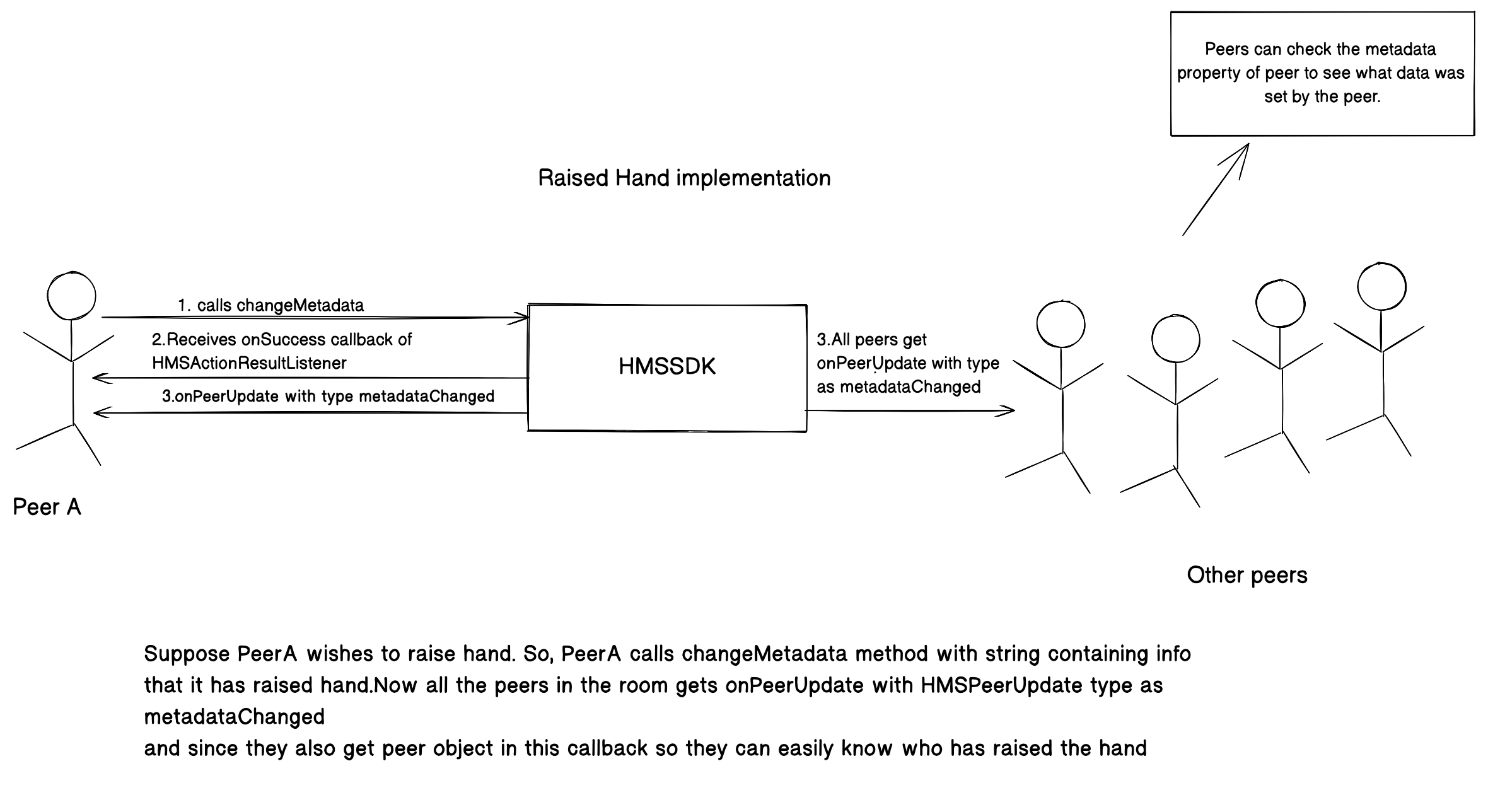Persistent Participant States (Peer Metadata)
Looking for a persistent state that can be set on a peer and updated anytime, for everyone in the room? Peer metadata is it.
Metadata can be set initially in the HMSConfig object that's passed into the join method. This can be used to display profile pictures as the user's avatar in meetings. You can imagine metadata as a persistent object attached to the peer which has more details about them.
Peer Metadata can be changed after joining the Room as well.
To set metadata before joining the room, pass the metadata property to HMSConfig used to Join the Room.
HMSConfig config = HMSConfig(userName: "John Doe", authToken: "eyJH5c", metadata: "{"avatar": "location/on/amazon/storage"}");
This section will show you how to:
- Get Peer Metadata.
- How to respond when a remote peer changes its metadata.
- How to set a peer's metadata.
Get Peer metadata
To get peer metadata, read the metadata value on any HMSPeer instance as:
void getPeerMetadata(HMSPeer peer){ //Setting String as nullable since metadata can be null as well String? metadata = peer.metadata; }
How to listen to updates when metadata of any peer is updated
Whenever a remote peer's metadata is updated a callback will be received in onPeerUpdate({required HMSPeer peer, required HMSPeerUpdate update}) of HMSUpdateListener where the HMSPeerUpdate type will be HMSPeerUpdate.metadataChanged as:
class Meeting implements HMSUpdateListener, HMSActionResultListener{ ... void onPeerUpdate( {required HMSPeer peer, required HMSPeerUpdate update}) async { switch (update){ ... case HMSPeerUpdate.metadataChanged: //We can get the metadata from HMSPeer object String? metadata = peer.metadata break; ... } } }
When this callback is received the UI for that peer should be updated as well.
How a peer can set its metadata
Here is how a peer can set their own metadata to a random string. In this case, the string is stringified JSON.
Example String: "{\"Zodiac Sign\": \"Virgo\" }"
class Meeting implements HMSUpdateListener, HMSActionResultListener{ ... void changeMetadata( {required String metadata, required HMSActionResultListener hmsActionResultListener}) { ///[metadata] is a stringified JSON as above ///[hmsActionResultListener]: an instance of a class that implements HMSActionResultListener //Here this is an instance of a class that implements HMSActionResultListener that is Meeting hmsSDK.changeMetadata( metadata: metadata, hmsActionResultListener: this); } void onSuccess( {HMSActionResultListenerMethod methodType = HMSActionResultListenerMethod.unknown, Map<String, dynamic>? arguments}) { switch (methodType) { case HMSActionResultListenerMethod.changeMetadata: //metadata updated successfully break; ... } } void onException( {HMSActionResultListenerMethod methodType = HMSActionResultListenerMethod.unknown, Map<String, dynamic>? arguments, required HMSException hmsException}) { switch (methodType) { case HMSActionResultListenerMethod.changeMetadata: // Check the HMSException object for details about the error break; ... } } }
Use cases
Implement hand raise in applications
This is a very common requirement where the people attending a webinar or online class wish to ask a question they can let the speaker know by raising their hands in the application similar to what they would have done in an offline event
Let's understand this with a diagram:

Let's check the implementation step-by-step:
PeerA calls changeMetadata
Peer A calls changeMetadata with metadata as: "{\"isHandRaised\":true}" since the metadata string is a stringified JSON.
We can also use jsonEncode() method for this.
class Meeting implements HMSUpdateListener, HMSActionResultListener{ ... String metadata = "{\"isHandRaised\":true}"; hmsSDK.changeMetadata( metadata: metadata, hmsActionResultListener: this); void onSuccess( {HMSActionResultListenerMethod methodType = HMSActionResultListenerMethod.unknown, Map<String, dynamic>? arguments}) { switch (methodType) { case HMSActionResultListenerMethod.changeMetadata: //Here we will get the update regarding changeMetadata method break; ... } } void onException( {HMSActionResultListenerMethod methodType = HMSActionResultListenerMethod.unknown, Map<String, dynamic>? arguments, required HMSException hmsException}) { switch (methodType) { case HMSActionResultListenerMethod.changeMetadata: // Check the HMSException object for details about the error break; ... } } }
PeerA receives onSuccess event
This shows that the method call was successful.
All the peers receive onPeerUpdate
As soon as we get onSuccess callback for changeMetadata method call, all the peers in the room will get onPeerUpdate callback
with HMSPeerUpdate type as HMSPeerUpdate.metadataChanged.
Let's see how we can update the UI using this:
class Meeting implements HMSUpdateListener, HMSActionResultListener{ ... void onPeerUpdate( {required HMSPeer peer, required HMSPeerUpdate update}) async { switch (update){ ... case HMSPeerUpdate.metadataChanged: //We can get the metadata from HMSPeer object if(peer.metadata?.contains("\"isHandRaised\":true")){ //This shows that peer has raised the hand //UI can be updated by using the peer object } break; ... } } }



